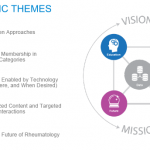
In the late 18th century, Prussian military theorist Carl von Clausewitz said, “Our knowledge of circumstances has increased, but our uncertainty, instead of having diminished, has only increased. The reason of this is that we do not gain all our experience at once, but by degrees; so our determinations continue to be assailed incessantly by fresh experience; and the mind, if we may use the expression, must always be under arms.”
While the work of the ACR is far different than the work of an 18th century Prussian military force, and basic tenets ring true. Strategic thinking and planning has been a recipe for success for the ACR for more than a quarter of a century. Our vision statement in 2010 was, “To enhance the value and impact of rheumatology in a changing healthcare environment.” Indeed, the “changing healthcare environment” has been a moving target, and we have been “assailed incessantly” by those changes.
Planning for ACR’s Future
Late in 2012, we convened a task force to develop the strategic plan for 2013–2016, to strategically think about how best to represent our members moving into the future. ACR Board of Directors (BOD) members Will Harvey, MD, and Sharad Lakhanpal, MD, led us through a process to identify and address the critical needs of the membership and of the field of rheumatology. There was broad agreement that the plan would need to focus on what the ACR must offer and/or change to remain relevant to our members, while taking a proactive approach in addressing the never-ending changes to healthcare. The 22-member Strategic Planning Task Force (SPTF) was constituted to represent the diversity of ACR membership, including leadership, practice setting, research activity, pediatrics, health professionals, age, and gender. ACR staff members also contributed in the development of the plan. The SPTF considered a wealth of information, including a broad survey of the membership, recommendations from committee chairs, an SPTF survey, the report of the Blue Ribbon Panel on Academic Rheumatology, and the report from the 2020 Task Force.
Not surprisingly, common themes emerged from a review of the major reports and surveys that were considered by the SPTF. The issue of healthcare economics, the Affordable Care Act, and a perplexing array of possibilities for payment reform surfaced as the most commonly cited external threats to our members and to the field of rheumatology. Similarly, our difficulty in having the value of our field recognized by key stakeholders was frequently cited as an issue that we must address. Our highly successful Simple Tasks campaign is increasing our visibility, but the issue of value continues to present a challenge for us. Workforce issues came through loud and clear, with grave concerns for the future of academic rheumatology—the training ground for the future of our field—and for the future of rheumatology practice as we know it today. Internally, the existing IT infrastructure of the ACR was viewed as an impediment to development of novel educational content and delivery modalities, as well as our ability to expand the reach of our organization nationally and around the globe. Further, as everyone becomes busier and busier, and many of us struggle with multiple, competing responsibilities and priorities, the ACR must find a way to reshape volunteerism and give more of us a chance to share our passion and our unique skills and abilities.

